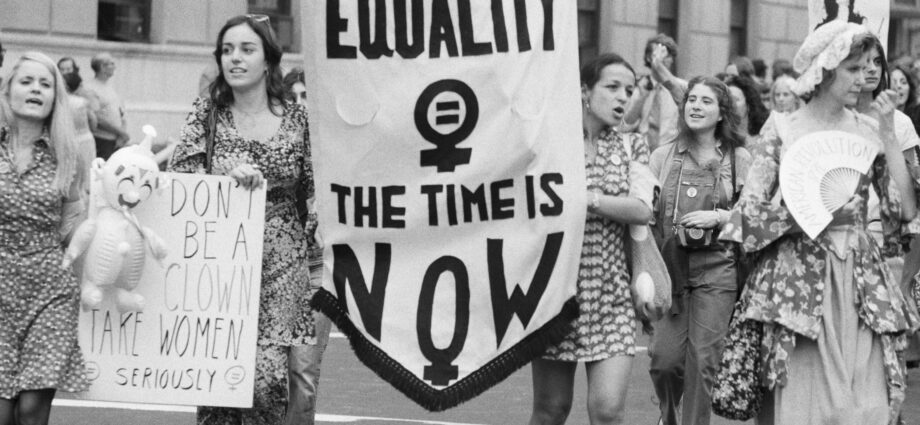Садржај
- Women’s rights: there is still a lot to do
- 1. A woman’s salary is on average 15% lower than that of a man.
- 2. 78% of part-time jobs are held by women.
- 3. Only 15,5% of trades are mixed.
- 4. Only 30% of business creators are women.
- 5. For 41% of French people, professional life for a woman is less important than family.
- 5. Pregnancy or maternity is the third criterion of discrimination in the field of employment, after age and sex
- 6. In their business, 8 out of 10 women believe that they are regularly confronted with sexism.
- 7. 82% of parents in single-parent families are women. And… 1 in 3 single-parent families live below the poverty line.
- 9. Women spend 20:32 hours on household chores per week, compared to 8:38 hours for men.
- 10. 96% of beneficiaries of parental leave are women.
Women’s rights: there is still a lot to do
1. A woman’s salary is on average 15% lower than that of a man.
In 2018, according to the latest Eurostat study carried out on the remuneration of Europeans, in France, for an equivalent position, the remuneration of women is on average i15,2% lower than for men. A situation which, today, “no longer accepted by public opinion”, Estimates the Minister of Labor, Muriel Pénicaud. However, it should be remembered that the principle of equal pay between women and men has been enshrined in law since… 1972!
2. 78% of part-time jobs are held by women.
Another factor that explains the pay gap between women and men. Women work almost four times as much as men part time. And this one is most often suffered. This figure has dropped slightly since 2008, when it was 82%.
3. Only 15,5% of trades are mixed.
The mix of professions is not yet for today, nor for tomorrow for that matter. Many stereotypes persist on so-called male or female professions. According to a study by the Ministry of Labor, for jobs to be distributed equitably between each sex, a minimum of 52% of women (or men) should change activity.
4. Only 30% of business creators are women.
Women who embark on business creation are often a little more educated than men. On the other hand, they are less experienced. And they have not always previously exercised a professional activity.
5. For 41% of French people, professional life for a woman is less important than family.
Conversely, only 16% of people think this is the case for a man. Stereotypes about the place of women and men are tenacious in France as this survey of the.
5. Pregnancy or maternity is the third criterion of discrimination in the field of employment, after age and sex
According to the latest barometer of the Defender of Rights, the main criteria of discrimination at work cited by victims refer above all to gender and pregnancy or motherhood, for 7% of women. Proof that the fact of
6. In their business, 8 out of 10 women believe that they are regularly confronted with sexism.
In other words, 80% of employed women (and as many men) say they have witnessed jokes about women, according to a report from the Higher Council for Professional Equality (CSEP). And 1 in 2 women have been directly affected. This “ordinary” sexism is still rife everywhere, every day, as Marlène Schiappa, Secretary of State recalled it last November. in charge of Equality between women and men, when Bruno Lemaire welcomed the appointment of a Secretary of State by her first name only "It’s a bad habit that should be lost, it’s ordinary sexism indeed“, She added. “It is usual to call female politicians by their first name, to describe them by their physical appearance, to have a presumption of incompetence when one has a presumption of competence when you are a man and you wear a tie".
7. 82% of parents in single-parent families are women. And… 1 in 3 single-parent families live below the poverty line.
Lone-parent families are more and more numerous and, in the majority of cases, the only parent is the mother. The poverty rate of these families is 2,5 times higher than that of all families according to the National Observatory on Poverty and Social Exclusion (Onpes).
9. Women spend 20:32 hours on household chores per week, compared to 8:38 hours for men.
Women spend three and a half hours a day on domestic chores, compared to two hours for men. Active mothers continue to work double days. It is they who mainly carry out domestic work (washing up, cleaning, tidying up, caring for children and dependents, etc.) In France, these tasks occupy them at the rate of 20:32 a.m. per week compared to 8:38 a.m. for men. If we integrate DIY, gardening, shopping or playing with children, the imbalance is slightly reduced: 26:15 for women against 16:20 for men.
10. 96% of beneficiaries of parental leave are women.
And in a little over 50% of cases, mothers prefer to stop their activity altogether. The 2015 reform of parental leave (PreParE) should promote better sharing of leave between men and women. Today, the first figures do not show this effect. Due to the excessively high pay gap between men and women, couples do without this leave.










